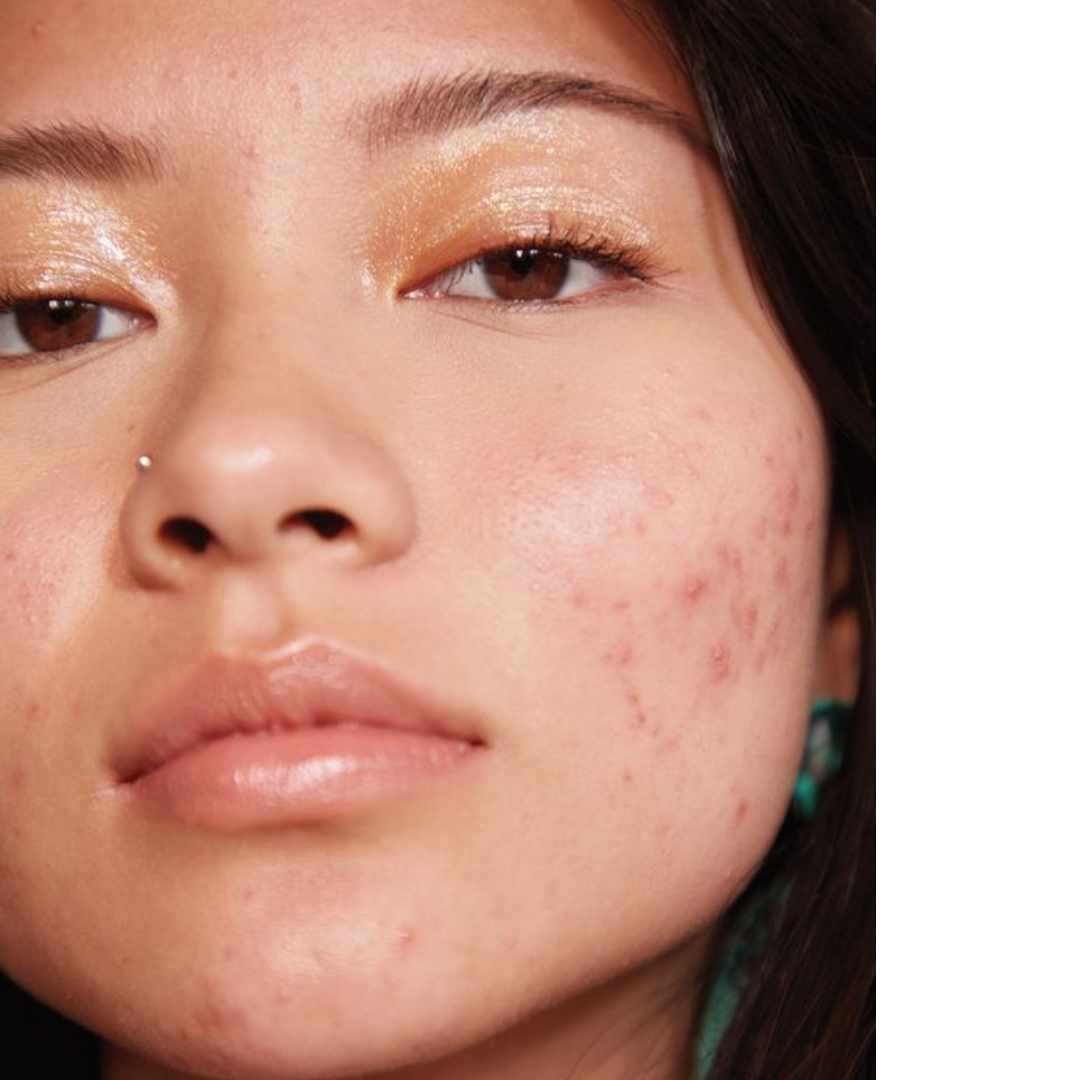
How to get rid of acne on the face?
Share
Acne is an inflammatory skin disease that mainly affects teenagers, but many adult women also suffer from it. The condition manifests itself as pimples, blackheads, whiteheads, papules, pustules and, in more severe cases, nodules and cysts. Understanding the causes of acne and knowing effective treatments can help manage this frustrating condition. In this article, we'll explore the different causes of acne, the treatments available, and strategies to reduce its impact.

Causes of acne
Acne develops when the skin's pores become clogged with excess sebum and dead skin cells. The main causes of acne include:
- Sebum secretion: Excessive production of sebum, an oily substance produced by the sebaceous glands, can clog pores and lead to acne.
- Bacteria: Bacteria present on the skin, notably Propionibacterium acnes, can infect clogged follicles, causing inflammation.
- Hormones: Hormonal fluctuations, particularly in adult women, can increase sebum production and encourage the appearance of acne.
- Genetic factors: Acne can be hereditary. If your parents suffered from acne, it's likely that you will too.
- Stress: Stress can exacerbate acne by triggering hormonal changes and increasing sebum production.
- Diet: Although the link between diet and acne is still debated, certain foods such as dairy products and foods with a high glycemic index can aggravate acne in some people.
Types of acne
Acne manifests itself in different forms, each requiring a specific approach to treatment:
- Blackheads (open comedones): These are pores clogged with sebum and dead skin cells. They appear black due to the oxidation of sebum on the skin's surface.
- Whiteheads (closed comedones): Clogged pores where sebum and dead cells are trapped beneath the skin's surface, forming a small white bump.
- Papules pustules: Small, red, inflamed, often painful bumps that can develop into pus-filled pustules.
- Nodules and cysts:Very severe forms ofacne, these deep, painful lesions are often resistant to conventional treatments and can leave permanent scars.
Local treatments
Local treatments are the first resort for mild to moderate acne. They are applied directly to the affected skin and include :
- Benzoyl peroxide: An antibacterial treatment that reduces acne-causing bacteria and helps unclog pores. Available in various concentrations, it can be found in creams, gels and cleansers.
- Salicylic acid An exfoliant that helps remove dead skin cells and unclog pores. It is present in our VIBRE cleanser.
- Topical retinoids: Derived from vitamin A, retinoids (such as tretinoin and adapalene) promote cell renewal and prevent pore clogging.
- Topical antibiotics: Used to reduce bacteria and inflammation, they are often combined with other treatments such as benzoyl peroxide.
- Azelaic acid: A substance that helps reduce bacterial growth and inflammation, often used to treat mild to moderate acne.
Prescribed treatments
For moderate to severe acne, a dermatologist may prescribe more powerful treatments:
- Oral antibiotics: Used to reduce bacteria and inflammation, they are often prescribed for more severe cases of acne.
- Oral contraceptives: For women, oral contraceptives can regulate the hormones that trigger excessive sebum production.
- Isotretinoin: A vitamin A derivative taken orally, isotretinoin is extremely effective for very severe acne. However, it has significant side effects and requires close medical supervision.
- Hormonal treatments: For adult women whose acne is hormone-related, treatments such as spironolactone can be prescribed to reduce sebum production.
Psychological repercussions
Acne is not just a physical condition; it can also have significant psychological repercussions. Acne sufferers can experience shame, low self-esteem, anxiety and even depression. It's essential to recognize these impacts and seek psychological support if necessary. Talking to a mental health professional can help manage the emotional effects of acne.
Complementary strategies for managing acne
In addition to medical treatments, several complementary strategies can help reduce acne and improve skin health:
- Skin care routine: Adopting the right skin care routine is crucial. Use gentle cleansers, avoid irritating products, and moisturize your skin even if it's oily.
- Avoid touching your face: Touching or squeezing pimples can aggravate acne and cause scarring.
- Balanced diet: Although the link between diet and acne is controversial, some find that cutting back on dairy products and foods with a high glycemic index can help.
- Reduce stress: Practice stress management techniques such as yoga, meditation or regular exercise to help regulate hormones.
- Hydration: Drinking enough water helps keep skin hydrated and eliminate toxins.
- Sun protection: Use a non-comedogenic sun cream to protect your skin from UV rays without clogging pores.
Prevention and maintenance
Preventing acne involves a combination of daily care and healthy lifestyle choices:
- Regular cleansing: Cleanse your face twice a day with a mild cleanser to remove excess sebum and impurities.
- Non-comedogenic products: Choose skincare and make-up products labeled "non-comedogenic", which means they won't clog pores.
- Gentle exfoliation: Exfoliate your skin once or twice a week to remove dead cells, but avoid aggressive scrubs that can irritate the skin.
- Moisturizing: Use a light moisturizing cream adapted to your skin type to maintain your skin's moisture balance.
- Avoid irritants: Avoid products containing alcohol, perfumes and other potential irritants that can aggravate acne.
- Accessory hygiene: Change your pillowcases regularly, clean your make-up brushes and avoid touching your face with dirty hands.
Conclusion
Getting rid of acne on the face requires a multifaceted approach involving medical treatments, appropriate skin care, and lifestyle changes. Understanding the causes of acne and choosing the right treatments can make a big difference. Don't forget that acne is a complex inflammatory disease that can have significant psychological repercussions. It's crucial to consult a dermatologist for an accurate diagnosis and a personalized treatment plan. By combining local treatments, prescription medications and skin care strategies, it's possible to effectively manage acne and improve the health and appearance of your skin.

